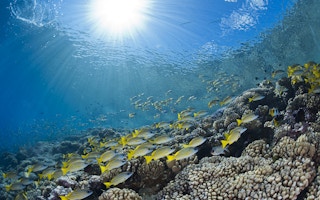Recent studies have shown several marine species are struggling to adapt to the excess carbon dioxide and heat which oceans are absorbing. Evidence is mounting of the risks we’re taking with our oceans.
Life is finely tuned to the physical and chemical conditions that surround it. This “tuning” is the result of thousands – if not millions – of years of natural selection, optimising the physiological and biochemical ways marine organisms respond to a naturally variable environment.
But there are limits to how much organisms can “acclimate” to this variability. Beyond a certain point, organisms increasingly fail to cope. This leads to decreased performance and eventually death.
Marine life is no different.
A recent meta study led by Dr Elvira Poloczanska (CSIRO) and Anthony Richardson (University of Queensland) revealed that 83 per cent of the time, organisms responded to the world’s warming oceans the way you would expect them to under climate change.
Populations tend to expand to higher latitudes as conditions warm, rather than not responding or moving in the opposite direction. This is because temperature fundamentally affects what life does, from enzyme systems to the behaviour of populations and communities.
The relative alkalinity of ocean waters is the second fundamental parameter to which marine life is tuned. Solutions with a pH of above 7 are referred to as alkaline. Those below 7 are acidic. As with temperature, pH is critically important in physiology, especially for marine life in a mildly alkaline ocean.
Changes in pH directly influence membrane transport, deposition of calcium carbonate, and the exchange of gases. These changes affect growth, skeleton and shell formation, and respiration, among many other physiological processes.
Change these two fundamental parameters and you have the potential to change almost everything. And most likely in a very negative way!
Consequently, there is considerable concern that the burning of fossil fuels by humans is changing the physics and chemistry of the ocean in ways not seen for tens of millions of years. As CO2 has entered the atmosphere, millions of tons (or about 25 per cent of total human-caused emissions) has disappeared into the world’s oceans. On the positive side, removing this amount of atmospheric CO2 has prevented a large amount of climate change.
But this CO2 has decreased the pH of the ocean by approximately 0.1 pH units. It seems a small amount, but involves a 26 per cent decrease in the concentration of hydronium ions and the all-important carbonate ion, used in making shells.
A recent study by Hönisch and co-workers has indicated that current changes in fundamentals (temperature and pH) are unprecedented within the last 65 million if not the last 300 million years of Earth history. These changes are pushing Earth well beyond the environmental “envelope” in which it has been for millions upon millions of years. While we know this with some certainty, we have very little understanding of the ramifications. How will marine ecosystems change? What about the planetary and human systems that depend on them.
Astrid C Wittmann and Hans-O Pörtner from the Alfred Wegener Institute in Germany published a paper this week which evaluated the sensitivity of a range of marine organisms under representative concentration pathways. These pathways are used to describe scenarios with different amounts of greenhouse gases such as CO2. The results show that corals, echinoderms (such as starfish and sea urchins) and molluscs were more sensitive than crustaceans to high levels of atmospheric CO2 (936 ppm in 2100). Sensitivity of larval fish was greater than for the invertebrates in the study.
The authors conclude that ocean acidification will be a significant factor for the future of ocean ecosystems. It could result in large-scale shifts to the ecological structure of the world’s oceans.
While the results give some indication of how life might change in the ocean as CO2 increases, they don’t really address other variables such as increased temperature. As the paper by Poloczanska et al indicates, temperature is a powerful variable. But what happens if you combine ocean acidification and warming, as is likely under future ocean conditions?
Harvey and co-workers show that ocean warming and acidification interact synergistically, with a response greater than the impact of each variable on its own, in the case of calcification, photosynthesis, reproduction and survival. Growth was not similarly affected. The study highlights the urgent need to move toward experiments which combine variables as opposed to investigate them singularly.
Studies such as those led by Poloczanska, Wittmann and Harvey present more than enough evidence for the risks involved in changing the fundamental variables of temperature and pH. While the scientific community struggles to do the perfect experiments to capture the potential impacts of climate change and ocean acidification, however, global society is undertaking its own experiment with the planet.
The only problem is that reversing this grand and somewhat nightmarish global experiment will take thousands of years once fossil fuels have been exhausted or discontinued.
Professor Ove Hoegh-Guldberg is the director of the Global Change Institute at the University of Queensland. This post originally appeared here.










